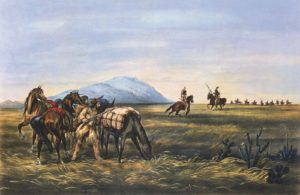The idea of the frontier is often referred to, and employed, as an accepted concept of an empty space that is open to exploration. However, what does the ‘frontier’ actually mean?

The Rocky Mountains: Emigrants Crossing the Plains, lithograph by Currier & Ives, 1866. Retrieved from Britannica https://www.britannica.com/topic/American-frontier
And what activities does it entail?
Conde & Walter advance a traditional sense of the idea of the frontier, defining “commodity frontiers as the locus where extraction geographically expands, colonizing new land in search for raw materials”. Klinger on the other hand, argues that “frontiers are not permanent spaces but instead are conjured by specific interest groups in order to be conquered”. This definition contends the idea of the frontier as an empty space. Rather it highlights how frontiers themselves hold different valuations within the same space. Therefore, rather than the frontier being a specific space that is there to be taken, it is constructed as a frontier by specific interests. These interests profit from the conception of the space as empty, as the idea of the frontier being empty, justifies the taking of this space for profit-making purposes. However, in doing so the other valuations of the space are ignored. This can be seen for example, with the idea of the moon as an empty space that is open to exploration and exploitation. Constructing the idea of the moon as a new frontier, aids the discourse of colonizing it for capitalist purposes.
The idea of the frontier is often employed with regard to unexplored places, such as the Amazon, the Arctic, the deep sea or the Moon. While some of these geographies are less ‘empty’ than others, they all hold competing valuations, be it scientific research, conservation, or biodiversity to name just a few. The argument of the frontier is used to move into these spaces, despite the existing valuations that they hold.
Frontier arguments are not solely limited to geography. They are also applied to new methods and resources. The advances in technology is itself portrayed as a new frontier in the extractive possibilities for humankind. This is pushed by the development of new needs which turn substances into commodities for extraction. The invention of new needs and the accompanying requirement for resources brings with it new demands for specific resources. Together, they construct the idea of new frontiers, developing and extracting that which was not there before. However, in actuality the resource was always there, as was the possibility of the technology, it is only with the value of it for our own uses that it becomes real and holds significance due to its valuation.
This discourse of the frontier can also be used and applied to further specific interests. For example in the case of rare earths and lunar exploration, the idea of the frontier is used to further geopolitical aims. By first securitizing the issue of rare earths and utilizing the idea of space as “last frontier”, lunar mining can be constructed in such a way as to justify the taking of this space of private companies under the national flag of a state.
The use of discourse of the frontier for extractive purpose stems from a dual desire to both isolate the reality of the extraction while at the same time utilizing the space to gain or hold territorial claims. Moreover, utilizing this to gain control over historically contested extraction sites brings with it control over not only the land in question, but also the infrastructure, transport, and processing spaces, as well as local labor and reproductive regimes. Each must be controlled against outside threats, real or imagined, whoever the outsider may be. The Moon, as a rare earth frontier, was conjured as such following the 2010 rare earths ‘crisis’.
Therefore, the employment of the use of the idea of the frontier in discourse should be examined critically, particularly with regard to the assertion of spaces as empty.
By Belinda von Aesch
References:
Conde, M. and Walter, M. (2014) “Commodity Frontiers”, in G. D’Alisa, F. Demaria and G. Kallis (eds), Degrowth. A Vocabulary for a New Era (New York and London: Routledge), 71–74.
Klinger, Julie Michelle (2018). Rare earth frontiers: From terrestrial subsoils to lunar landscapes. Cornell University Press
Larsen P.B. (2015) “Post-frontier Resource Governance” Hampshire: Palgrave Macmillan
Sandro Mezzadra & Brett Neilson (2017) On the multiple frontiers of extraction: excavating contemporary capitalism, Cultural Studies, 31:2-3, 185-204, DOI: 10.1080/09502386.2017.1303425